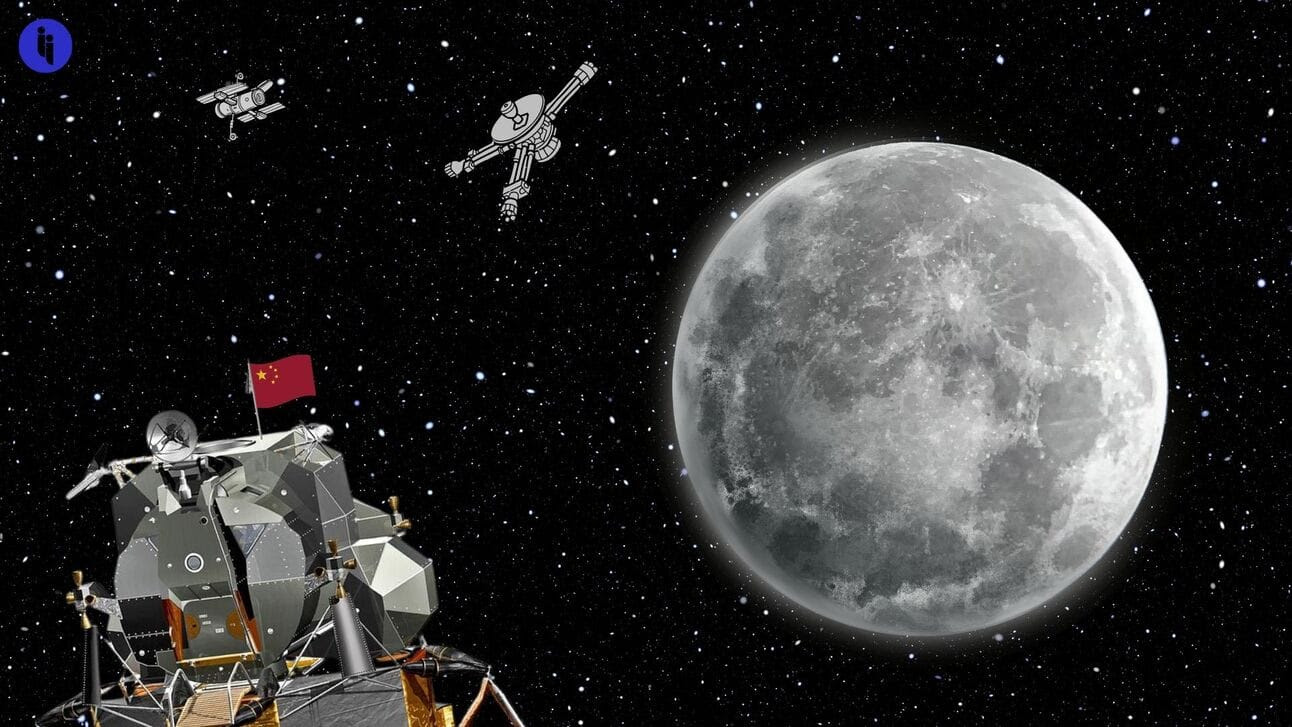We like to think Pink Floyd’s ‘Dark Side of the Moon’ was blasting when the Chang’e 6 lunar probe touched down in Inner Mongolia yesterday (Tuesday), carrying the first-ever samples of matter from the far side of the moon.
China’s space agency launched the Chang’e 6 back on May 3 from China’s tropical Hainan Island. It then landed on the far side of the moon (without line-of-sight comms) a month later, kicking off a space-aged game of hot potato:
- A lunar rover spent three days drilling and collecting lunar samples
- That rover then transferred the goodies to an ascender module, which took off and began orbiting the moon
- That ascender module then linked up with the orbiter module and passed on the lunar dust and rocks
- Finally, the orbiter passed the goods to an atmospheric re-entry module, which landed safely back in China yesterday.
While the mission lasted 53 days, China has actually been working on its lunar exploration project since 2004. And it’s now got two goals left: i) a planned robotic outpost near the Moon’s south pole, to test key technologies for ii) astronauts to land there by 2030.
Stay on top of your world from inside your inbox.
Subscribe for free today and receive way much more insights.
Trusted by 134,000+ subscribers
No spam. No noise. Unsubscribe any time.
Now, you might recall that US astronauts set foot on the Moon more than half a century ago, and NASA repeated the feat another five times until 1972. But the Moon is now hot again:
- India scored the world’s first soft-landing on the Moon’s south pole last year
- Japan scored the world’s first ‘pinpoint’ lunar landing in January
- China has now brought back the first darkside samples
- A US company scored the first private robotic landing in February
- Russia says it wants to land its first astronauts on the Moon within a decade (though it crashed a probe there last year), and
- The US itself is planning to land astronauts on the moon again in 2026
So why is the Moon so hot right now? The Chang’e mission has a few different aims:
- At home
When China first kicked off its lunar program two decades ago, the wind was in the country’s sails: double-digit annual growth, the Beijing Olympics around the corner, and a sense of inevitability around its rise as a global player.
But that 2004 decision is now paying dividends in a very different China: growth has slowed right back, investor sentiment has soured, youth unemployment is at record highs, and several of China’s neighbours and trading partners have been spooked by President Xi Jinping’s more forceful approach.
So against that gloomy backdrop, this week’s lunar feat has presented China’s ruling communist party with some much-needed front-page fodder. For Xi and his party, that coverage alone has probably made the mission worthwhile.
- Abroad
Landing on the Moon is also the geopolitical equivalent of telling your mates you just climbed Everest. It earns you bragging rights, and elevates your status as someone with the necessary calves / technological prowess to get there.
Xi spelled it out himself, describing the Chang’e 6 mission as a “landmark achievement in our country’s efforts at becoming a space and technological power”.
- Up above
China also says it’ll share these new darkside samples with the international scientific community, though it hasn’t specified any deets yet.
Scientists are hoping this new lunar dust will help answer all sorts of questions about how planets form, what the early solar system looked like, and whether the Moon might have sources of ice for a future human presence.
So there are plenty of reasons why China and others are now looking back to the heavens.
INTRIGUE’S TAKE
The People’s Republic has run some interesting branding exercises over the years. Under former leader Hu Jintao, China said it was undergoing a ‘peaceful rise’, though it rebranded in 2004 as a peaceful ‘development’ after concluding that the word ‘rise’ suggested China was a threat to the status quo.
But even the roots of that initial ‘peaceful rise’ slogan are interesting: the term was coined by Zheng Bijian, an influential government advisor. And subsequent research suggests it was part of a Ministry of State Security influence operation aimed at smoothing global perceptions of China’s growth.
Still, parallel research elsewhere has also long reminded us that, even when speaking to the rest of the world, the party’s audience is still fundamentally domestic, in support of social and political stability at home.
That’s why the results can seem so discombobulating abroad: one day China is promising to share its scientific bounty with the world as a responsible power; the next day, it’s threatening Philippine sailors with axes in defiance of an international ruling on maritime boundaries.
Back home, those two messages might seem less discordant: they both point to Xi and his own preferred slogan, “the great rejuvenation of the Chinese nation“.
Also worth noting:
- Only five powers have ever successfully landed unmanned missions on the moon: the Soviet Union, the US, China, India, and Japan (in that order). Only one has landed humans there (the US).








